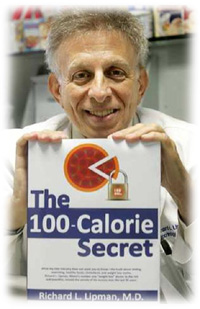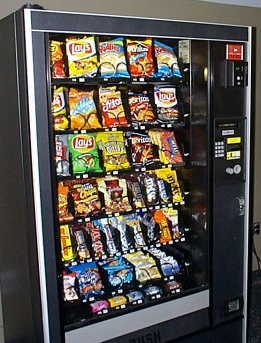The 100 Calorie Secret is Turning The Diet Industry Upside Down. A Weight Loss Doctor Finally Reveals the Secret of How to Lose Weight Without Dieting Ever Again Lose 10, 20, 30 and More Pounds Right Now!
Diplomat of American Board of Internal Medicine
Endocrinology & Metabolic Disorders
Vending Machines In Schools Promote Childhood Obesity
Richard Lipman MD
305-670 3259
Vending Machines in Schools: Sodas, Juices, Chocolate Milk, and Frito Lay Seduces America’s Boards of Education: 9723 Slots & only 23 For Healthy Foods!
Vending machines promote child and teen obesity
In an age when 30 % of children are at risk for being overweight or obese, the epidemic of overeating is evenor being more compounded when children and teens are faced not only with
bad school lunches, but also with machines spitting out all kinds of junk foods. Local school boards have to accept whatever the Federal Government sends to them,
but it’s another whole issue when school boards are paid off by junk food distributors that fill up school machines.
Vending Machines are Big Busines:
About half of the nation's schools districts have e contracts with soft drink companies to help fund extracurricular activities. Some school districts receive hundreds of thousands of dollars up front from large corporations just to sign an exclusive contract with a company.
High schools in Arizona report making $2000 a month from soft drink sales. .
A School in Michigan made $50,000 from sales of vending machines in a few months..
Princeton City School District in Ohio received $136,000 up front from Coke-Cola for a 10-year contract, and receives 40 percent of all sales ($18,000 last year) from the machines. Several schools in Alabama, through the contracts with soft drink companies and other vendors, took in as much as $100,000 a year; money that pays for such things as computer rewiring, teacher training and Black History Month activities.
How Prevalent is Eating and Drinking from Vending Machines?
The National Gallup Youth Survey found:
Vending machines cause obesity because of the food they contain.
23% say they eat "a great deal" of junk food (defined as food that is convenient but isn't considered healthy) in a typical week; 61% say they eat some; 14% eat hardly any; 2% eat none.
67% say they buy junk food or soda from machines at school.
75% of the teens who describe themselves as overweight say they buy junk food or soda at school, compared with 65% of those who feel that they are about right or underweight.
A Nationwide Survey of Vending Machines in Middle Schools and High Schools:
75 percent of the drinks and 85 percent of the snacks sold are high in calories and are of poor nutritional value. The study of 1,420 machines in 251 schools, was organized by the Center for Science in the Public Interest (CSPI) and conducted by 120 volunteers:
How Many Items Do They Buy?
71% reported buying sugar-sweetened sodas or other beverages, 68% bought one to three vending machine items and 79% of 141 students who bought four or more.
What do they Buy?
75 percent of rinks and 85 percent of snacks in school vending machines are unhealthy with three times as many students buying sugar sweetened beverages as compared to any other foods or drinks.
The Center for Science in the Public Interest (CSPI) reported in 2004 that of 9,723 snack slots in all the vending machines surveyed, only 26 slots contained fruits or vegetables.
Does Eating Fast Food Affect Vending Machine Use at School?
When students were asked about vending-machine purchases and visits to fast-food restaurants in the preceding week, researchers found the number of items purchased at school vending machines was directly related to the overall number of visits to fast food restaurants outlets. "These findings suggest that school vending machines and fast-food restaurants make independent contributions to total [sugar-sweetened beverage] intake that increase with repeated exposure or use," write researcher Jean Wiecha, Ph.D., of the Harvard School of Public Health, and colleagues.
What Are We Doing To Reduce Vending Machine Usage at Schools?
State by state the public through their state legislatures have begun to revolt against this situation. Arkansas was first to ban elementary school students' access to vending machines offering food and soda. California banned vending machine sales of carbonated beverages to and replaced them with milk, water and juice. In 2004, four states enacted laws regarding vending machines in schools out of approximately 70 bills introduced in 25 states. This includes Colorado, Louisiana, Tennessee, and Washington. Currently bills are pending in 28 other states.



